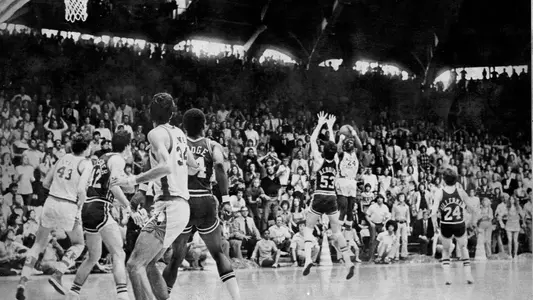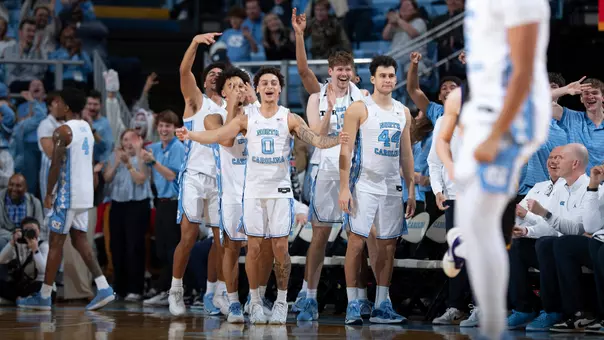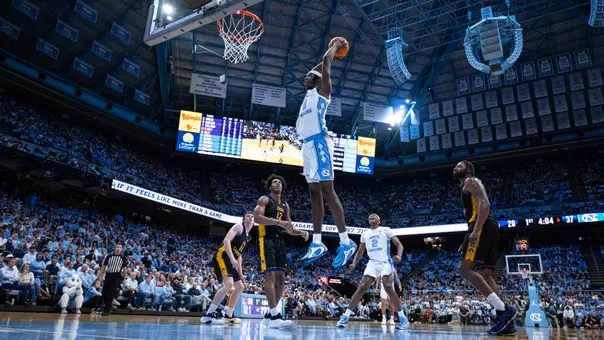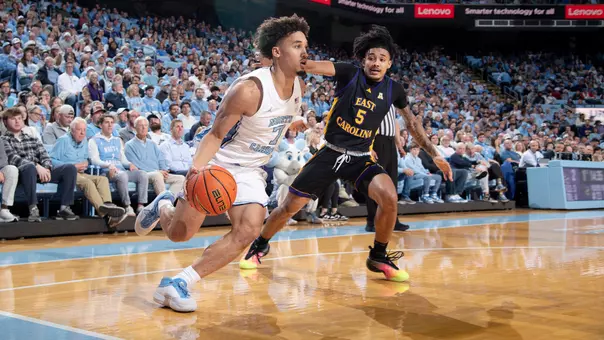University of North Carolina Athletics

Walter Davis hit this 25-footer against Duke on March 2, 1974, to cap an eight-point comeback in 17 seconds.
Born & Bred: The Quintessential Comeback
March 1, 2024 | Men's Basketball
Fifty years ago, Dean Smith and his Tar Heels orchestrated the signature rally in college basketball history
Note: This article originally appeared in Born & Bred, the exclusive magazine for members of The Rams Club.
Walter Davis was in the wrong place.
Tomorrow is the 50th anniversary of Carolina's incredible eight points in 17 seconds comeback against Duke on March 2, 1974. It's a celebration of a perfectly orchestrated, completely improbable Tar Heel victory. It's a case study in Dean Smith's late game management. It includes one of the most famous shots in the program's history—Davis' game-tying bank shot—described by one of the most famous radio calls in Woody Durham's archive, as the longtime voice of the Tar Heels shouted, "Un-bee-lee-va-ble!" after the ball banked through at the end of regulation.
And it all happened only because Davis didn't do exactly what he was supposed to do.
Before that moment, though, Carolina needed every possible factor to break in exactly the right way in order to make the comeback. They'd already beaten Duke once that season on what seemed at the time like a miraculous finish; on Jan. 19 at Cameron Indoor Stadium, with the score tied at 71, Bobby Jones stole a Duke inbounds pass and hit a layup at the buzzer to give the fifth-ranked Heels a 73-71 victory.
The Blue Devils were poised to get revenge on March 2 at Carmichael. They'd built an 86-78 lead with just 17 seconds left. College basketball didn't yet have the three-point line, and the clock didn't stop after made baskets. The conditions, in other words, were not conducive to such a miraculous comeback.
On the Tar Heel Sports Network, in fact, Woody Durham was already going through some ACC Tournament scenarios in the event of a Duke victory.
During a timeout before Bobby Jones attempted two free throws with 17 seconds left, Smith began laying the foundation for the comeback.
"Coach Smith knew exactly what was going to happen in every sequence that occurred," says John Kuester, a member of the 1974 team. "He told us, 'We're in a great spot. After Bobby makes the free throws, we're going to steal the ball, get a layup, and call timeout.' He had an ability to save those timeouts and understand when to use them. And we used every single one in that situation."
Sure enough, Jones hit both ends of a one-and-one to draw Carolina within 86-80. Duke botched the inbounds pass, the Tar Heels recovered, and Kuester made a layup. The score was 86-82. Thirteen seconds remained.
"The whole time the comeback was happening, Coach Smith was very calm in the huddle," says Ed Stahl, a member of the 1974 team. "He'd say something like, 'Now fellas, we need to steal the inbounds pass, make a lay-up and call timeout.' And of course, we always did what Coach Smith said to do, so that's what we did.
"He had an uncanny confidence in those situations. He would always say something like, 'Isn't this fun?' And it was. When we broke the huddle, we always had the belief that it would play out the way we had prepared for it to."
The Tar Heels again created defensive havoc, forcing another Blue Devil turnover. In the scrum, Stahl missed a shot, but Jones grabbed the rebound and scored. Carolina trailed by just two points with six seconds remaining.
Timeout, Tar Heels. The stream of Carolina fans that had started for the Carmichael exits started to reverse. Fans who had already left the building were not allowed back inside unless they knew a friendly usher or made a break for it.
Inside, Smith was once again explaining to his players what was about to unfold.
"In that timeout," Kuester says, "Coach Smith looked at us and said, 'Listen, guys, they're probably going to get the ball in this time. We have to foul immediately. When he misses, we'll get the rebound and call timeout.'"
That's what happened. Duke inbounded the ball to junior Pete Kramer, an ostensibly safe choice. He had shot 82 percent from the free throw line as a sophomore, and would eventually shoot 82 percent as a senior.
As a junior, though, he'd encountered some inexplicable struggles, and was hitting just 57.9 percent of his free throws. There was no double bonus in 1974, so Kramer had to convert a one-and-one.
He obligingly missed the front end. Stahl grabbed the rebound and signaled for a timeout with three seconds left.
In that final timeout, Smith drew up a play for Davis, a freshman from Pineville who less than a year earlier had received his first recruiting letter from Carolina. Now, Smith was asking him to tie the game against a hated rival.
Mitch Kupchak threw the inbounds pass. Davis, who passed away on Nov. 2, 2023, talked about the sequence in 2020.
"I ran the wrong route," he said. "I couldn't see behind me, and I didn't know if they had somebody following me. I was supposed to catch the ball on our side of the court. But I went all the way back closer to Kupchak because I thought a defender was behind me and would try to steal the ball. I went into the backcourt, took three quick dribbles, and shot it. A guy jumped at me, so I put more arc on it than I was accustomed to, and it banked in."
And was the bank shot intentional?
"I was shooting," Davis said with a grin, "for a swish."
No matter what the intention, it went in, tying the game at 86 and sending a partially full Carmichael into a frenzy.
Duke took a temporary 92-89 lead in overtime, but Carolina scored the final seven points of the game to win, 96-92. Brad Hoffman scored four key points in the extra period, and Davis finished with a game-high 31. Twenty-four of those points came after halftime.
The performance is one of the most legendary in Carolina history, a fixture on any list of the program's five biggest shots ever. It also forever cemented Smith as the master of the game's final seconds.
"I was a sophomore on that team," says Dave Hanners, who was eventually also a Carolina assistant coach. "At the first timeout, when we were down eight with 17 seconds left, Coach Smith's first words were, 'Seventeen seconds is an eternity in college basketball.' I wasn't playing, so I was near the back of the huddle. I'm thinking to myself, 'What is he talking about?'
"He tells us four things: we can steal the inbounds pass, we can take a charge before the ball is entered, we can get a five-second call, or we can foul the moment the ball comes inbounds. I'm thinking, 'That's easier said than done.' And then bang, it happens.
"We score and come back to the bench and now I'm a step closer to the huddle. The same thing happens. We score and call timeout. Now I'm in the middle of the huddle. I'm shouting, 'Guys, we're going to win the game!'"
Every Tar Heel who ever played for Smith is intimately familiar with that exact same sense of belief instilled by the coaching staff. It's that confidence that inspired numerous late-game rallies, and a constant fear from opponents that Carolina was never truly out of the game.
"We were in so many tight games in my Carolina career," Kuester says. "The poise Coach Smith had in those situations was amazing. He was pumped up, and you knew he was in the game, but he never got excited and could tell everyone exactly what needed to be done. In my four years, we never thought we were out of a game. We always thought we had a chance—and that's in large part because we had already come back from eight points in 17 seconds during my freshman year."
Smith realized, of course, that it wasn't some inherent brilliance that allowed his teams to make those comebacks. There were certain variables that he knew impacted any game, and he wanted his teams to understand they couldn't control everything.
The day after the incredible comeback against the Blue Devils, the Tar Heels assembled at Carmichael for practice. The first order of business: Smith handed the ball to Kupchak on the baseline at the exact spot where he'd thrown the pass the previous day. He put the other four Tar Heels in their same locations on the court that had led to the game-tying basket. Morale was high. Momentum was strong. His team was feeling indestructible, and he had a point to make.
"Run it again," the head coach told his team. Kupchak threw the ball to Davis. With no one in the stands, no one on defense and no one watching on television, he caught the pass, took a couple dribbles, eyed the basket and let it fly.
It was an airball.
Walter Davis was in the wrong place.
Tomorrow is the 50th anniversary of Carolina's incredible eight points in 17 seconds comeback against Duke on March 2, 1974. It's a celebration of a perfectly orchestrated, completely improbable Tar Heel victory. It's a case study in Dean Smith's late game management. It includes one of the most famous shots in the program's history—Davis' game-tying bank shot—described by one of the most famous radio calls in Woody Durham's archive, as the longtime voice of the Tar Heels shouted, "Un-bee-lee-va-ble!" after the ball banked through at the end of regulation.
And it all happened only because Davis didn't do exactly what he was supposed to do.
Before that moment, though, Carolina needed every possible factor to break in exactly the right way in order to make the comeback. They'd already beaten Duke once that season on what seemed at the time like a miraculous finish; on Jan. 19 at Cameron Indoor Stadium, with the score tied at 71, Bobby Jones stole a Duke inbounds pass and hit a layup at the buzzer to give the fifth-ranked Heels a 73-71 victory.
The Blue Devils were poised to get revenge on March 2 at Carmichael. They'd built an 86-78 lead with just 17 seconds left. College basketball didn't yet have the three-point line, and the clock didn't stop after made baskets. The conditions, in other words, were not conducive to such a miraculous comeback.
On the Tar Heel Sports Network, in fact, Woody Durham was already going through some ACC Tournament scenarios in the event of a Duke victory.
During a timeout before Bobby Jones attempted two free throws with 17 seconds left, Smith began laying the foundation for the comeback.
"Coach Smith knew exactly what was going to happen in every sequence that occurred," says John Kuester, a member of the 1974 team. "He told us, 'We're in a great spot. After Bobby makes the free throws, we're going to steal the ball, get a layup, and call timeout.' He had an ability to save those timeouts and understand when to use them. And we used every single one in that situation."
Sure enough, Jones hit both ends of a one-and-one to draw Carolina within 86-80. Duke botched the inbounds pass, the Tar Heels recovered, and Kuester made a layup. The score was 86-82. Thirteen seconds remained.
"The whole time the comeback was happening, Coach Smith was very calm in the huddle," says Ed Stahl, a member of the 1974 team. "He'd say something like, 'Now fellas, we need to steal the inbounds pass, make a lay-up and call timeout.' And of course, we always did what Coach Smith said to do, so that's what we did.
"He had an uncanny confidence in those situations. He would always say something like, 'Isn't this fun?' And it was. When we broke the huddle, we always had the belief that it would play out the way we had prepared for it to."
The Tar Heels again created defensive havoc, forcing another Blue Devil turnover. In the scrum, Stahl missed a shot, but Jones grabbed the rebound and scored. Carolina trailed by just two points with six seconds remaining.
Timeout, Tar Heels. The stream of Carolina fans that had started for the Carmichael exits started to reverse. Fans who had already left the building were not allowed back inside unless they knew a friendly usher or made a break for it.
Inside, Smith was once again explaining to his players what was about to unfold.
"In that timeout," Kuester says, "Coach Smith looked at us and said, 'Listen, guys, they're probably going to get the ball in this time. We have to foul immediately. When he misses, we'll get the rebound and call timeout.'"
That's what happened. Duke inbounded the ball to junior Pete Kramer, an ostensibly safe choice. He had shot 82 percent from the free throw line as a sophomore, and would eventually shoot 82 percent as a senior.
As a junior, though, he'd encountered some inexplicable struggles, and was hitting just 57.9 percent of his free throws. There was no double bonus in 1974, so Kramer had to convert a one-and-one.
He obligingly missed the front end. Stahl grabbed the rebound and signaled for a timeout with three seconds left.
In that final timeout, Smith drew up a play for Davis, a freshman from Pineville who less than a year earlier had received his first recruiting letter from Carolina. Now, Smith was asking him to tie the game against a hated rival.
Mitch Kupchak threw the inbounds pass. Davis, who passed away on Nov. 2, 2023, talked about the sequence in 2020.
"I ran the wrong route," he said. "I couldn't see behind me, and I didn't know if they had somebody following me. I was supposed to catch the ball on our side of the court. But I went all the way back closer to Kupchak because I thought a defender was behind me and would try to steal the ball. I went into the backcourt, took three quick dribbles, and shot it. A guy jumped at me, so I put more arc on it than I was accustomed to, and it banked in."
And was the bank shot intentional?
"I was shooting," Davis said with a grin, "for a swish."
No matter what the intention, it went in, tying the game at 86 and sending a partially full Carmichael into a frenzy.
Duke took a temporary 92-89 lead in overtime, but Carolina scored the final seven points of the game to win, 96-92. Brad Hoffman scored four key points in the extra period, and Davis finished with a game-high 31. Twenty-four of those points came after halftime.
The performance is one of the most legendary in Carolina history, a fixture on any list of the program's five biggest shots ever. It also forever cemented Smith as the master of the game's final seconds.
"I was a sophomore on that team," says Dave Hanners, who was eventually also a Carolina assistant coach. "At the first timeout, when we were down eight with 17 seconds left, Coach Smith's first words were, 'Seventeen seconds is an eternity in college basketball.' I wasn't playing, so I was near the back of the huddle. I'm thinking to myself, 'What is he talking about?'
"He tells us four things: we can steal the inbounds pass, we can take a charge before the ball is entered, we can get a five-second call, or we can foul the moment the ball comes inbounds. I'm thinking, 'That's easier said than done.' And then bang, it happens.
"We score and come back to the bench and now I'm a step closer to the huddle. The same thing happens. We score and call timeout. Now I'm in the middle of the huddle. I'm shouting, 'Guys, we're going to win the game!'"
Every Tar Heel who ever played for Smith is intimately familiar with that exact same sense of belief instilled by the coaching staff. It's that confidence that inspired numerous late-game rallies, and a constant fear from opponents that Carolina was never truly out of the game.
"We were in so many tight games in my Carolina career," Kuester says. "The poise Coach Smith had in those situations was amazing. He was pumped up, and you knew he was in the game, but he never got excited and could tell everyone exactly what needed to be done. In my four years, we never thought we were out of a game. We always thought we had a chance—and that's in large part because we had already come back from eight points in 17 seconds during my freshman year."
Smith realized, of course, that it wasn't some inherent brilliance that allowed his teams to make those comebacks. There were certain variables that he knew impacted any game, and he wanted his teams to understand they couldn't control everything.
The day after the incredible comeback against the Blue Devils, the Tar Heels assembled at Carmichael for practice. The first order of business: Smith handed the ball to Kupchak on the baseline at the exact spot where he'd thrown the pass the previous day. He put the other four Tar Heels in their same locations on the court that had led to the game-tying basket. Morale was high. Momentum was strong. His team was feeling indestructible, and he had a point to make.
"Run it again," the head coach told his team. Kupchak threw the ball to Davis. With no one in the stands, no one on defense and no one watching on television, he caught the pass, took a couple dribbles, eyed the basket and let it fly.
It was an airball.
Carolina Women's Basketball 2025-26 | In Pursuit: Episode 3 - "Joy and Fire"
Wednesday, December 24
UNC Men's Basketball: Tar Heels Breeze Past ECU, 99-51
Tuesday, December 23
Carolina Insider: Rapid Reactions pres. by Modelo – Men’s Basketball vs. ECU – December 22, 2025
Monday, December 22
MBB: Tar Heels Breeze Past ECU, 99-51
Monday, December 22














